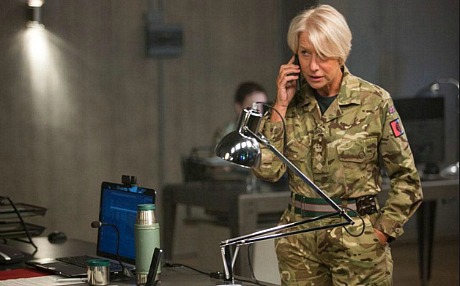As previously noted, Gavin Hood‘s Eye in The Sky (Bleecker Street, 3.11 NY & LA, 4.1 wide) was well reviewed at last September’s Toronto film Festival — 94% on Rotten Tomatoes, 70% on Metacritic. But the trailer suggested that this high-tech thriller, a study of the strategic tensions and moral determinations behind a lethal drone attack upon African terrorists, might be on the flat and simplistic side.
Or at least it seemed that way to me. Plus the trailer indicated too many CUs and MCUs of military and government types staring at video screens, I felt. Worst of all I wasn’t looking forward to another oppressively sincere performance by HE nemesis Aaron Paul.

Helen Mirren in Gavin Hood’s
Eye in the Sky (Bleecker Street, 3.11 — 4.1 wide).
Well, the trailer misled. Eye in the Sky is anything but pat or simplistic. It’s a gripping, disciplined, morally complex nail-biter — smart and focused and tight as a drum. It’s well augmented by a concise, well-written screenplay (the author is Guy Hibbert), and by direction and editing that gets right down to business and doesn’t fool around. The whole thing held me start to finish. The intrigue and tension levels never ebb.
Best of all it ends with a suspense sequence that Alfred Hitchcock himself would give a standing ovation to. He’d actually forget about the nearby tray of gourmet delicacies, I mean, and get out of his cushy easy chair and stand up and applaud.
Plus it delivers dead-on performances from almost everyone in the cast but particularly from Helen Mirren as a military intelligence officer who spends most of the film requesting an official okay to kill a team of suicide bombers with a drone strike, and from Alan Rickman as a British General who tries to persuade several anxious British politicians to stop equivocating and give the order already. Jeremy Northam, Iain Glen and Monica Dolan portray three of those equivocators with skill and conviction. And Barkhad Abdi (Captain Phillips) is highly engaging as a sympathetic field agent who operates a flying bug-cam that delivers video of the terrorists as things progress.
The ethical crux boils down to which is preferable or worse — sparing the life of a little girl who happens to be near a small home where terrorists are preparing a suicide mission by not firing a drone missile at the target, or not sparing her life by blasting the terrorists, who may kill dozens of innocents if their suicide plot isn’t stopped, to smithereens before they leave the abode.
Read more


